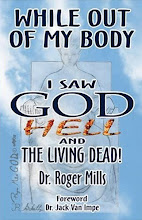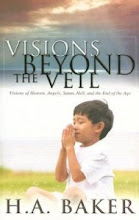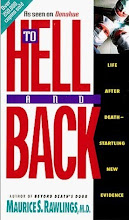Assuming that NDEs are merely hallucinations, it is odd that mass amounts of people are testifying to similar experiences. It also should be noted that there is a startling amount of accounts with the same vision of another reality existing over the present earth.
NDEs are not the result of drug or oxygen deprivation causing hallucinations, as "People tend to forget their hallucinations, whereas NDEs remain absolutely clear. If you ask people about the nature of their experiences while they are in the intensive care unit, you find they have a totally different flavor from NDEs." -Dr Fenwick
Dr. Jeff Long -"NDEs are quite varied, but the consistency of the NDE elements(OBE experience, tunnel, light, meeting other beings, etc.) is striking. There is no plausible biological explanation of NDEs. There is no other human experience so dramatic, shared by so many people, and so relatively consistent in its elements. The preceding suggests faith in the validity of NDE accounts is the most reasonable conclusion from the evidence."
German psychiatrist Michael Schroeter-In his extensive review of all published near death research states there is no reason to believe that NDEs are the result of psychiatric pathology or brain dysfunction.
2. NDE's are not a result of brain "awareness" of Near Death Experiences such as a tunnel, and seeing God.
NDEs Have Been Reported Since Ancient Times such as Plato's Testimony of a Soldier Named Er and His Near Death Experience.
Researcher P.M.H. Atwater, who has studied NDE in depth notes that NDE were experienced in Abraham Lincoln, Mozart, Albert Einstein, Queen Elizabeth I, Edward de Vere/the 17th Earl of Oxford, Winston Churchill, Black Elk, Walter Russell, as well as the Apostle Paul who described a NDE in 2 Corinthians 12:2-4.
This concludes that the brain does not produce images such as Susan Blackmore suggests as a possible explaination of NDE. Many of these historical individuals lived in a time where the NDE topic was not common knowledge.
3. The contunuation of the brain's survival after death is an invalid theory in the possible explaination of NDE's
Fenwick states that, "If the mind and brain can be independent, then that raises
questions about the continuation of consciousness after death.Dr Peter Fenwick determined that consciousness is not dependent on the brain, as he carefully describes the state of the body during a cardiac arrest:
"The first point is that signs of cardiac arrest are the same as clinical death. There is no detectable cardiac output, no respiratory effort, and brain stem reflexes are absent. If you are in this state and I put a tube down your throat, you will not cough.You will have dilated pupils. Your blood pressure has fallen to zero. You are, in fact, clinically dead. Even if I start cardiopulmonary resuscitation (CPR), I cannot get your blood pressure any higher than 30 millimetres of mercury, and this is not going to produce an adequate blood flow to your brain." - Dr Fenwick, Consultant Neuropsychiatrist emeritus at the Maudsley Hospital in the UK; Senior Lecturer at the Institute of Psychiatry; and Consultant Neuropsychiatrist at the Radcliffe Infirmary Oxford; and Honorary Consultant Clinical Neurophysiologist at Broadmoor Hospital
"A number of studies show that the longer CPR is continued, the more brain damage occurs. So it is not an ideal intervention. We know that after a cardiac arrest, both NDErs and non-NDErs suffer brain damage, but we do not know whether the amount of brain damage in the two groups is the same or different. During CPR, you are not going to be able to perfuse – that is, force an adequate amount of blood through – the brain. When the heart does finally start, the blood pressure rises, and there is a slow resumption of circulation and lots of technical reasons why your brain function does not return instantly. And the point to remember is that your mental state during recovery is confusional."
"What should be clear to you now is that it is not a good thing to have a heart attack. In their 1999 study of cardiac arrest and brain damage, Graham Nichol and his colleagues found that out of 1,748 cardiac arrests patients, only 126 survived (Nichol, Stiell, Hebert, Wells, Vandemheen, and Laupacis, 1999). Most units range between 2 and 20 percent resuscitation rates. Eighty-six of Nichol’s survivors were interviewed, and most of the people who were resuscitated had evidence of brain damage."
"Simultaneous recording of heart rate and brain output show that within 11 seconds of the heart stopping, the brainwaves go flat. Now, if you read the literature on this, some sceptical people claim that in this state there is still brain activity, but, in fact, the data are against this in both animals and humans. The brain is not functioning, and you are not going to get your electrical activity back again until the heart restarts." - Dr Fenwick
"The flat electroencephalogram (EEG), indicating no brain activity during cardiac arrest, and the high incidence of brain damage afterwards both point to the conclusion that the unconsciousness in cardiac arrest is total. You cannot argue that there are ‘‘bits’’ of the brain that are functioning; there are not. There is a confusional onset and offset, and there is no brain-based memory functioning. Everything that constructs our world for us is, in fact, ‘‘down.’’ There is no possibility of the brain creating any images. Memory is not functioning during this time, so it should be impossible to have clearly structured and lucid experiences, and because of brain damage, memory should be significantly impaired, and you should not be able to remember any experiences which occurred during that time."What is Fenwick saying?
Dr Fenwick is referring to Near Death Experience cases involving cardiac arrest patients. In these cases, he is stating that the brain completely stops working and there should be no way that it can enable the patient to continue experiencing anything. Under normal circumstances, even if the patient does have any experience, he should not be able to remember it and report it later. That's because his memory has already stopped functioning. After all, the person's brain has shut down completely.


























No comments:
Post a Comment